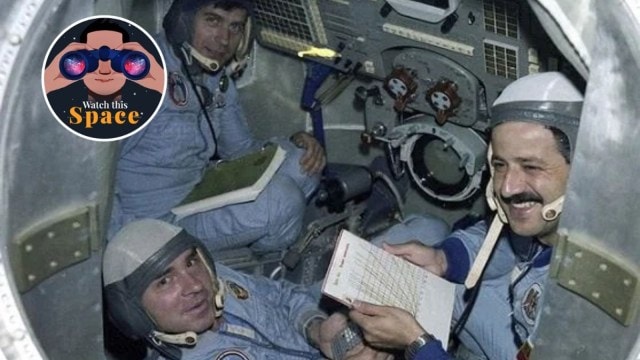Watch this space: Muhammad Faris, first Syrian astronaut, dies as a refugee
During his time in space, he decided to quit the military and make it his mission to educate people in science and astronomy, “to pass on the privileged view” he had been given.
 Muhammad Faris, the first and only cosmonaut from Syria (Image credit: roscosmos)
Muhammad Faris, the first and only cosmonaut from Syria (Image credit: roscosmos)Muhammad Faris, the first and only cosmonaut from Syria, died on Friday at the age of 72. Faris reportedly died as a result of long illness in Turkey, where he has lived as a refugee since 2012.
Faris was selected in 1985 as part of the Soviet Union’s Interkosmos program, according to Space.com. He launched on his first and only spaceflight on July 22, 1987 on Soyuz ™-3 with cosmonauts Aleksandr Viktorenko and Aleksandr Pavlovich Aleksandrov. At the time, he became the first foreign national to fly on a Russian spaceflight and the first one to visit the space station Mir.
There was one arab in space before him — Sultan Bin Salman Al Saud, part of the Saudi royal family — but Faris was the first professional Arab astronaut.
“Those seven days 23 hours and five minutes changed my life. When you have seen the whole world through your window there is no us and them, no politics,” said Faris in a 2016 interview to The Guardian. During his time in space, he decided to quit the military and make it his mission to educate people in science and astronomy, “to pass on the privileged view” he had been given.
Called the “Neil Armstrong of the Arab world,” Faris wanted to educate more Syrians in space and astronomy. After returning to Earth, he asked then-Syrian president Hafaz al-Assad (Bash al-Assad’s father) to start a national space program. His request was denied before he was eventually pushed to a position where he taught cadets to fly fighter aircraft, eventually rising to the rank of General while he was in the Air Force college.
But while Faris gained a new perspective on humanity when he flew so high above us, the same could not be said about his compatriots. The man who went into space felt the ground beneath his feet crack in the decades after his flight. He left Syria in the wake of the Arab spring and spent the rest of his life in Turkey, where he consulted the government on refugee rights.
Faris was not the first astronaut to get a new perspective on humanity after venturing into space and he was definitely not the last. After first returning from space, then 90-year-old actor William Shatner was overcome with emotions. He flew beyond the edge of space with Jeff Bezos in a mission led by the billionaire’s space company Blue Origin.
. “What you have given me is the most profound experience I can imagine. It’s extraordinary. Extraordinary. I hope I never recover from this,” Shatner told Bezos after landing, according to The Atlantic. What Shatner, Faris and other astronauts experienced is called the “overview effect,” a cognitive shift experienced by astronauts when they view Earth from space.
Frank White of the Space Studies Institute coined the phrase “overview effect” in the 80s. He found some common themes in this cognitive shift, which he wrote about in his book Overview Effect. Often, astronauts felt their sense of national belonging fade away and that feeling was replaced by a feeling of connection with human beings.
Michael Collins, the astronaut who flew around the Moon with the Apollo 11 mission, often said that if world leaders could experience this effect, it could help them settle their political differences. “That all-important border would be invisible, that noisy argument suddenly silenced,” he wrote in his memoir Carrying the Fire.







